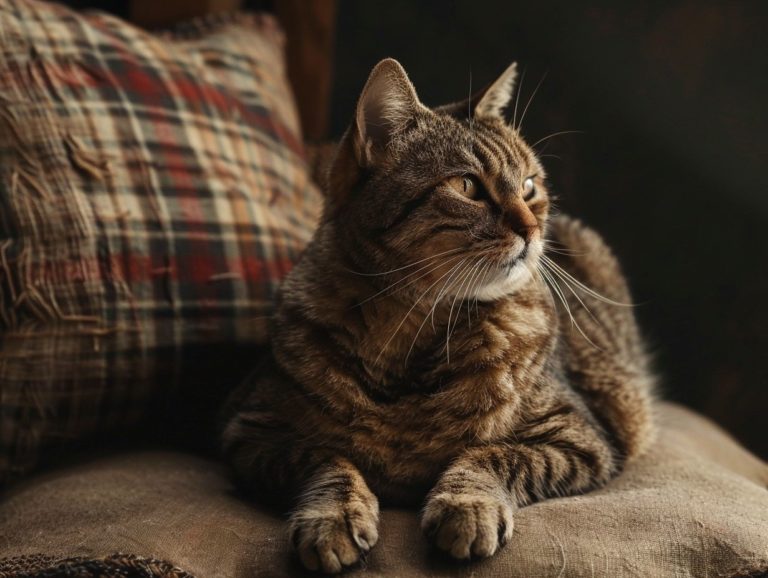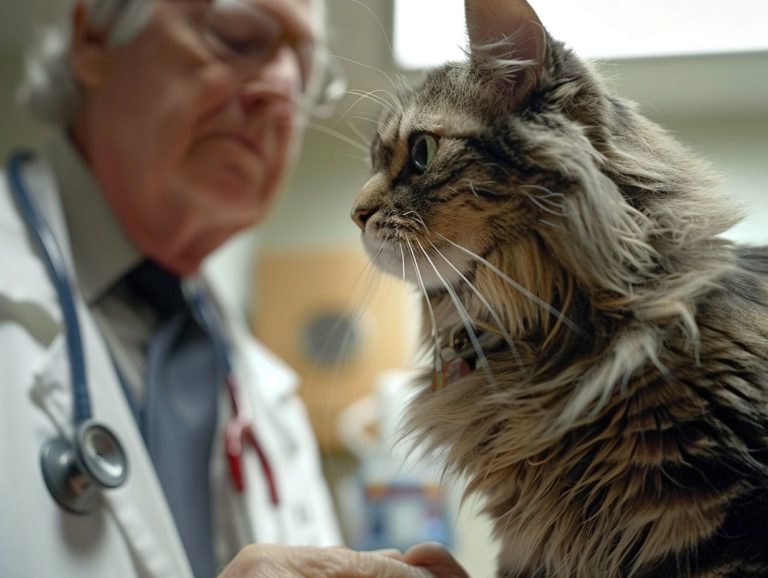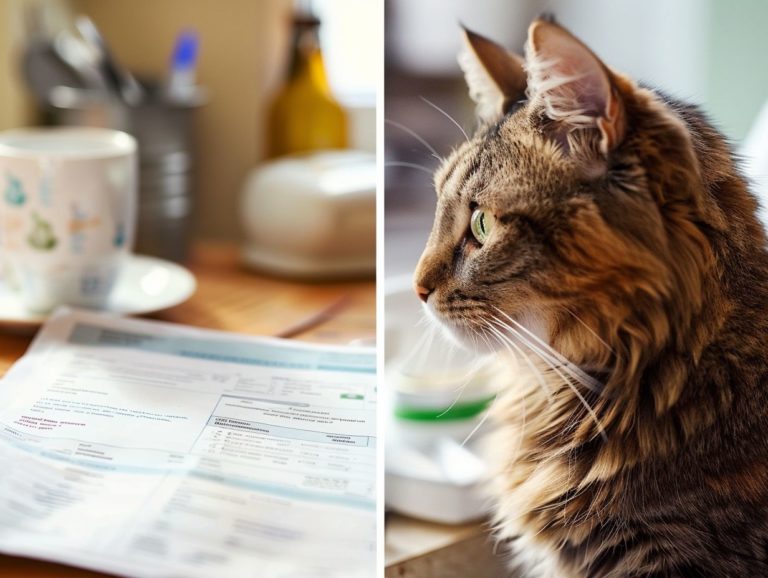Tailoring Insurance To The Needs Of Your Senior Cat
This guide covers the significance of pet insurance for senior cats, understanding the distinct requirements of senior cats, choosing the appropriate insurance plan, coverage options, strategies for managing insurance expenses, and prevalent health issues in senior cats.
It also offers advice on developing a care plan for your senior cat’s future and considerations for end-of-life care, as well as how to customize insurance to cater to the needs of your senior cat.
Key Takeaways:
The Importance of Pet Insurance for Senior Cats
The importance of pet insurance for senior cats lies in ensuring their well-being and quality of life during their advanced years, as senior cats often develop age-related conditions that require specialized care and treatment.
Pet insurance for senior cats serves as a financial safety net for unexpected and costly veterinary expenses that can result from common age-related conditions such as arthritis, kidney disease, or dental problems. This coverage alleviates the financial burden on pet owners and ensures that their senior cats receive necessary treatments. To understand the legal aspects of insuring your senior cat, it is crucial to explore tailored insurance options.
By providing peace of mind, pet insurance enables pet owners to make healthcare decisions based on their senior cat’s needs without undue concern about the financial aspect. Additionally, pet insurance can significantly impact a senior cat’s health and quality of life by promoting preventative care and early intervention.
Understanding the Unique Needs of Senior Cats
Senior cats have unique nutritional and medical requirements that differ from younger cats, including age-related problems such as mobility issues, decreased appetite, and changes in grooming habits. Key areas of special care for senior cats include their dietary needs, medical care, and living conditions tailored to their preferences and requirements.
In terms of diet, tailoring their diets to meet their nutritional needs is crucial for senior cats. Diets that are high in protein and easily digestible nutrients can help maintain their muscle mass and support overall health. As cats age, their dental health may deteriorate, making soft food diets easier to eat and digest.
Regarding wellness, regular veterinary visits become increasingly important for senior cats to monitor any health changes and diagnose potential issues promptly. Since cats tend to conceal symptoms of disease, these visits provide an opportunity for early intervention and treatment to help maintain the cat’s quality of life.
Creating a cat-friendly living environment is also crucial for senior cats, as they are creatures of habit and may feel stressed or uncomfortable if moved to a new home or environment. Providing easily accessible litter boxes, comfortable resting spots, and interactive toys can enhance their mental and physical health. This is especially important for senior cats, as discomfort may worsen age-related health problems.
Choosing the Right Insurance Plan for Your Senior Cat
Determining the appropriate insurance for a senior cat involves assessing factors such as their age, health status, preventative care needs, coverage options, and potential financial requirements for veterinary care and supplements. A veterinarian can assist in evaluating the best insurance policy for the senior cat.
Due to age-related health issues, senior cats require specialized care, making insurance highly beneficial for meeting their preventative care needs. Veterinarian recommendations play a crucial role in guiding pet owners towards insurance policies that cover annual check-ups, preventative care, and emergency situations when necessary.
These insurance policies often include benefits for chronic conditions, diagnostic tests, and prescription medications commonly needed by senior cats. Investing in comprehensive insurance ensures that senior cats will receive necessary medical attention without imposing significant financial burdens.
Factors to Consider
When choosing a pet insurance plan for senior cats, it is crucial to consider the coverage options, reimbursement model, cost, and the percentage of vet bills covered. Understanding these aspects can assist owners in making well-informed decisions.
Senior cats, due to their advanced age, may encounter more health issues and require frequent visits to the vet, underscoring the importance of comprehensive coverage. Owners should assess the reimbursement model of various pet insurance plans to determine whether they reimburse actual vet bills or follow a predetermined fee schedule. Opting for a plan with high limits and a straightforward reimbursement process can alleviate financial concerns related to unexpected vet expenses, enabling owners to focus on providing optimal care for their feline companions.
Coverage Options for Senior Cats
Senior cat insurance offers comprehensive care for senior cats, including wellness visits, end-of-life care, and medical treatment coverage. It is important to have insurance for senior cats to ensure they receive the necessary care.
Wellness visits are crucial for preventive care and early detection of health issues. End-of-life care provisions provide pet owners with comforting options for compassionate care during challenging times. Medical expense coverage helps offset the costs associated with age-related conditions and illnesses. Various insurance plans provide different levels of coverage, allowing pet owners to select the best option for their senior cat’s specific health requirements.
It is recommended for pet owners to explore these insurance options to guarantee that their senior cats receive adequate care as they age.
Medical Expenses and Treatment Coverage
Medical expenses and treatment coverage under pet insurance plans are crucial for ensuring that senior cats receive appropriate and timely medical care. Coverage for vet visits, medications, and medical procedures can significantly impact the quality of life of senior cats.
Regular veterinary check-ups are essential for early detection and intervention of age-related medical conditions in senior cats, such as kidney disease or arthritis. Financial assistance for medical expenses enables pet owners to afford regular check-ups for preventive care.
Insurance coverage for medication costs guarantees that senior cats receive the necessary prescriptions without spending money. In cases requiring advanced medical treatments or surgeries, having coverage alleviates the financial burden associated with costly procedures, allowing seniors to access the required medical care without hesitation.
End-of-Life Care Coverage
End-of-life care coverage for senior cats is designed to provide pet owners with support and financial assistance to ensure the delivery of comfort and quality care during the final stages of a pet’s life. This coverage includes veterinary consultations, medication, and compassionate end-of-life services.
A crucial component of pet insurance, end-of-life care insurance assists pet parents in navigating the decision-making process as they accompany their feline companion through the end-of-life journey. Having end-of-life policies in place enables owners to focus on the emotional aspects and quality time with their beloved cat without the additional stress of financial burdens associated with end-of-life care.
This support extends beyond medical expenses and may encompass additional services such as hospice care, pain management, and bereavement counseling for pet owners.
Tips for Managing Insurance Costs for Senior Cats
Insurance costs for senior cats can be effectively managed through discounts, savings opportunities, and financial assistance programs provided by insurance providers to alleviate the financial burden of senior cat care.
Discounts are commonly available for pets that receive regular preventive care from a licensed veterinarian, including vaccines, dental cleanings, and wellness exams. Some pet insurance companies offer discounts for insuring multiple pets within the same household or for choosing annual payment over monthly installments. Opting for a higher deductible can also reduce monthly premiums. Certain pet insurance providers may extend discounts to members of specific animal welfare organizations.
Pet owners can reach out to these organizations to inquire about special programs or grants that can assist in covering medical expenses for senior cats.
Discounts and Savings Opportunities
Discounts and savings opportunities offered in pet insurance plans can significantly alleviate the financial burden of senior cat care. Reimbursement models and wellness plans are among the advantageous options available to help meet their wellness needs in a cost-effective manner for senior cats.
Pet insurance policies that cover a wide range of veterinary services, including routine exams, diagnostics, and specialized treatments, prove beneficial for senior cats. A comprehensive plan ensures that older cats receive the necessary care and treatments without owners having to bear the full cost. Customize your senior cat’s insurance policy to fit their health needs today!
Wellness plans are also advantageous for addressing the unique care requirements of senior cats. These plans can be customized to improve the quality of life for senior cats and address common health issues that may arise in their older age, such as arthritis or dental health.
Common Health Issues in Senior Cats
Common diseases in senior cats, such as arthritis, dental disease, and kidney disease, can significantly impact their quality of life. Providing preventive care and addressing their health and wellness needs are crucial for maintaining the health of senior cats. Regular check-ups with the veterinarian play a key role in early detection of illnesses, especially those that are more prevalent in older cats like hyperthyroidism or diabetes. During these check-ups, the veterinarian may conduct a comprehensive physical examination, take blood and urine samples if necessary, and monitor the senior cat’s weight. This senior cat exam schedule, recommended by the American Association of Feline Practitioners as a general guide, helps in ensuring the well-being of senior cats.
Nutrition is fundamental for senior cat health. As outlined by the World Small Animal Veterinary Association (WSAVA), a well-balanced senior cat nutrition plan should include adequate energy, amino acids, fatty acids, vitamins, and minerals to support body function while preventing obesity. Protein is essential for maintaining lean muscle mass, moisture helps prevent dehydration and reduces the risk of urinary tract diseases, fiber promotes gastrointestinal health to prevent and manage constipation. A proper diet can assist senior cats in maintaining a healthy weight, with some senior diets specifically designed to provide better support to aging joints.
Pet insurance plays a valuable role in covering unexpected veterinary costs or treatments for senior cats, ensuring access to necessary medical care for a happy and healthy life in an affordable and timely manner.
Identifying and Addressing Potential Health Concerns
To ensure the well-being of senior cats, it is important for pet owners to be vigilant and proactive in addressing potential health concerns through regular monitoring, vet check-ups, and timely medical intervention. Monitoring weight fluctuations, grooming behavior, and eating habits plays a crucial role in maintaining the overall health and quality of life of senior cats.
Regular veterinary consultations are essential for early detection of medical issues commonly seen in senior cats, including arthritis, dental disease, and kidney failure. Caregivers should communicate any observed symptoms or behavioral changes to their vet and collaborate on developing a personalized care plan.
In managing conditions like hyperthyroidism and diabetes, medications play a key role in ensuring the optimal health of senior cats. Preventative measures such as dental cleanings and vaccinations are important in disease prevention. Ultimately, the happiness of senior cats depends on an integrated approach that addresses both their physical and emotional well-being.
Creating a Plan for Your Senior Cat’s Future Care
The comprehensive plan for the future care of a senior cat includes preparing for end-of-life issues, managing expenses, and ensuring the highest quality of life for the cat. This plan should encompass both medical and emotional support for the cat. Establishing a relationship with a veterinarian who can provide appropriate care for your aging senior cat is essential. Regular check-ups, discussing pain management options, and setting up a comfortable environment are key components of proactive care. Engaging in activities that support your cat’s physical and mental well-being, such as interactive play and gentle exercises, can help improve their quality of life. Addressing financial components via insurance or setting up a dedicated fund for emergencies can give you peace of mind.
Preparing for End-of-Life Care and Expenses
Preparing for end-of-life care and expenses for a senior cat involves understanding the costs associated with veterinary care, medication, and supportive services. It is crucial to provide a dignified and peaceful end-of-life experience to maintain an acceptable quality of life for senior cats.
When planning for your aging cat, it is important to consider end-of-life care options such as palliative care, hospice services, and pain management to ensure their comfort in their final days. These services may come with additional costs, so setting a budget aside or exploring pet insurance that covers end-of-life care is advisable.
Consulting your veterinarian for guidance and discussing alternative treatment options will assist you in making the best decisions while prioritizing your cat’s well-being. Being prepared and proactive will help you navigate this emotional period with greater peace of mind.
Frequently Asked Questions
1. What is the importance of tailoring insurance to the needs of your senior cat?
As your cat ages, their healthcare needs may change and become more expensive. Tailoring insurance to their specific needs can help cover these costs and ensure they receive the best care possible.
2. What age is considered “senior” for cats?
Cats are generally considered senior around the age of 9-10 years old. However, this can vary depending on breed and individual health.
3. What types of coverage should I look for when tailoring insurance for my senior cat?
When insuring a senior cat, it’s important to look for coverage that includes common age-related conditions such as arthritis, dental disease, and chronic illnesses. You may also want to consider coverage for end-of-life care and hospice services.
4. Can I still insure my senior cat if they have pre-existing conditions?
Yes, many insurers offer coverage for pre-existing conditions, but it may come at a higher cost or with certain limitations. It’s important to carefully review your policy to understand what is and isn’t covered.
5. How do I determine the best insurance plan for my senior cat?
When choosing an insurance plan for your senior cat, consider their age, health history, and any potential hereditary conditions. It’s also important to compare coverage and costs from different providers to find the best fit for your cat’s needs.
6. Is it too late to insure my senior cat?
No, it’s never too late to insure your senior cat. While it may come at a higher cost, having insurance in place can still help cover unexpected medical expenses and provide peace of mind for you and your feline companion.



